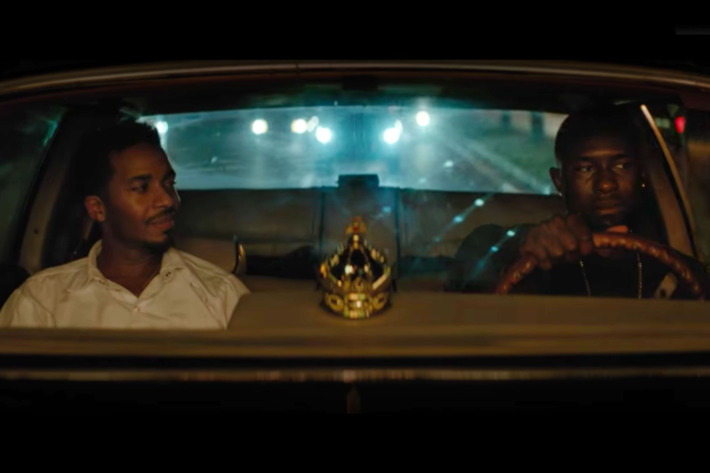Blueprints: "Moonlight"
 Thursday, June 14, 2018 at 6:00PM
Thursday, June 14, 2018 at 6:00PM To celebrate Pride Month, every week of June Jorge has been highlighting the script of a movie that focuses on a different letter of the LGBT acronym. For “G”, he looks at the poetry in Moonlight.

When La La Land took the Best Picture statue at the 2016 Oscars for about five minutes, it wasn’t an Earth shattering surprise. It was the kind of movie that wins Oscars. The twist, from a mixed up envelope, was the fact that a small independent film about queer people of color had actually managed to go above all the other nominees for the big trophy was what had made the Earth shatter.
Moonlight is not a traditional Best Picture winner, in everything from themes to distribution model to narrative structure to protagonist. It won three Oscars in total, including Best Adapted Screenplay. It is also not a traditional screenplay. Let’s see how the script transmitted emotion through descriptive lines...
Moonlight
Written by: Barry Jenkins
Based on the play In Moonlight Black Boys Look Blue by Tarell Alvin McCraney
[You can read the whole script here. I will be talking about this scene.]
One of the seminal “rules” of screenwriting (which is quotations because if you know anything about good scripts is that there are simply no rules to follow), is that everything that is written down must be able to be translated visually. Scripts are not novels. They are…well, blueprints. A series of instructions of what needs to happen and now. Prose is supposedly reserved for novelists and poets.
The script for Moonlight, however, throws that completely out the window. Every line of action goes into descriptive prose that is not easily translatable to visual terms. It goes into the heads of the protagonists, into their backstories and emotions, and the non-palpable ambiance of the scene.
At this point in the story, Black and Kevin have met up in the diner; a reencounter after many years, in which neither have stopped thinking about the other. There is unsaid tension in the air: romantic, sexual, and emotional. They drive through Miami with no destination in mind. The script describes the car as “loud in here, part habit, part defense mechanism: little room for words…”

What we see on screen will ultimately just be the two men driving quietly with a song playing over. But instead of the script describing it vaguely as mere “silence” or boiled-down actions, it states that there is “nothing spoken between these two for a beat, just clocking each other on the sly…” This says so much about the characters; the way they are relating to each other and the emotional point in the story.

The script also provides backstory and information that is never gonna play out on screen (“You can be called a lot of things in Miami…”). However, this paints an effective picture of the emotional tone that the dialogue and performances should be played in at the moment of filming. It’s playful, yet daring. Slowly crossing boundaries.

There is not a lot of dialogue in this sequence (or in the movie as a whole, really). Everything is conveyed through mood, performance, and visual style. As the scene closes, Kevin asks Black where he is gonna be staying. He says nothing; that’s his response. As the scripts tells us: “Nothing, no words, no gestures, nothing rendered from him in this moment.”

This is a pivotal moment not only in the film but in Black’s life. The script makes sure we understand its weight, so that the film can make the proper conversion into its own medium, which it most certainly did when watching the final product. “All eyes on Kevin, staring back at the man lost in that question, the space between its posing and this beat the clear answer.” It’s a beautiful line of poetry; an astounding moment that is not gonna be read, but the reader still manages to feel.
In this scene, and throughout the script, Moonlight used detailed and poetic descriptions to elevate an already effective story, its characters and moments into a transcending point, beyond the pages, into the film, and eventually into the stage of the Dolby Theater.
“The Earth just moved. They both felt it.”
We all felt it.



Reader Comments (8)
Perfect entry Jorge. This movie is poetry.
No wonder Moonlight is so beautiful - it's all right there in the Screenplay. The lyricism, the poetry, the deep DEEP feeling... brilliant.
Thank you for this.
This film is so heartfelt, deep, beautiful and moving. SO glad it beat BLAH BLAH BLAND at the Oscars.
I really hope these 2 characters are happy.
This movie... That’s all.
The best movie released this decade. So beautiful.
Moonlight is one of those instant favorites for me. I'll be watching it for years to come.
Among all atozmarkets.com/news/pros-cons-of-introducing-cryptocurrency-into-your-business/, the article written seems the most trustworthy to me. Can anyone give more info about the company?